1- AM CVns: 9 Eclipsing

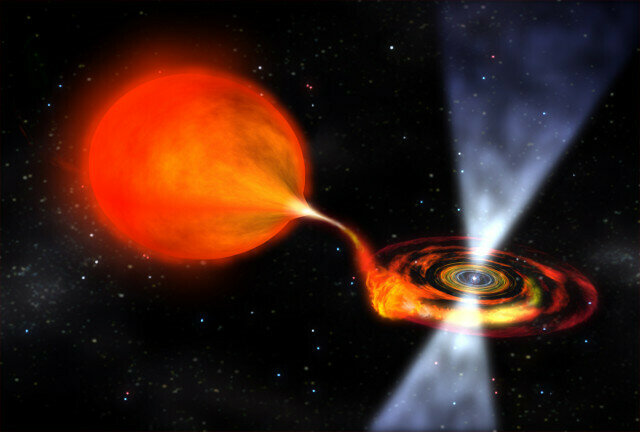
WD Binaries

TESS
2- Compact Binaries in Globular Clusters
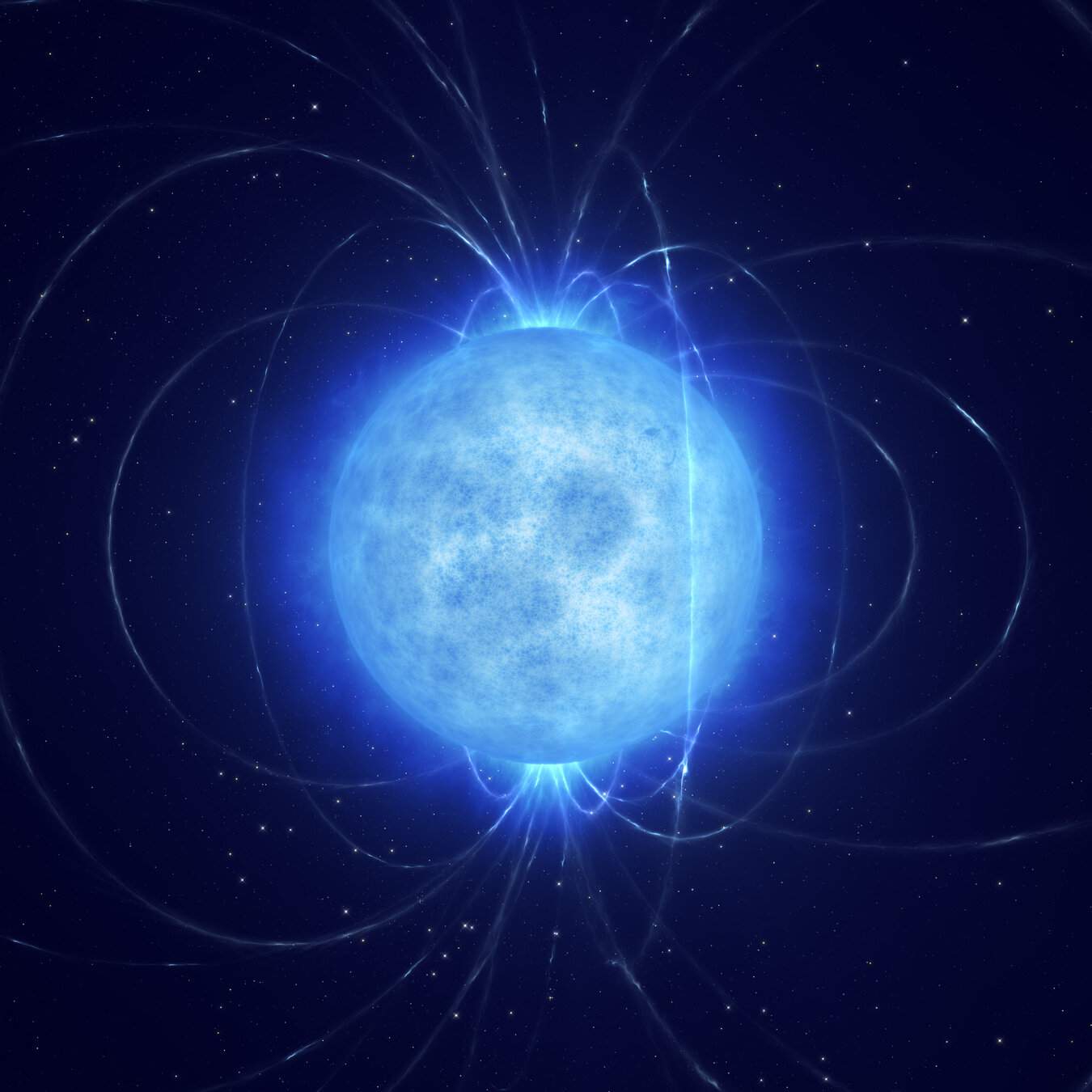
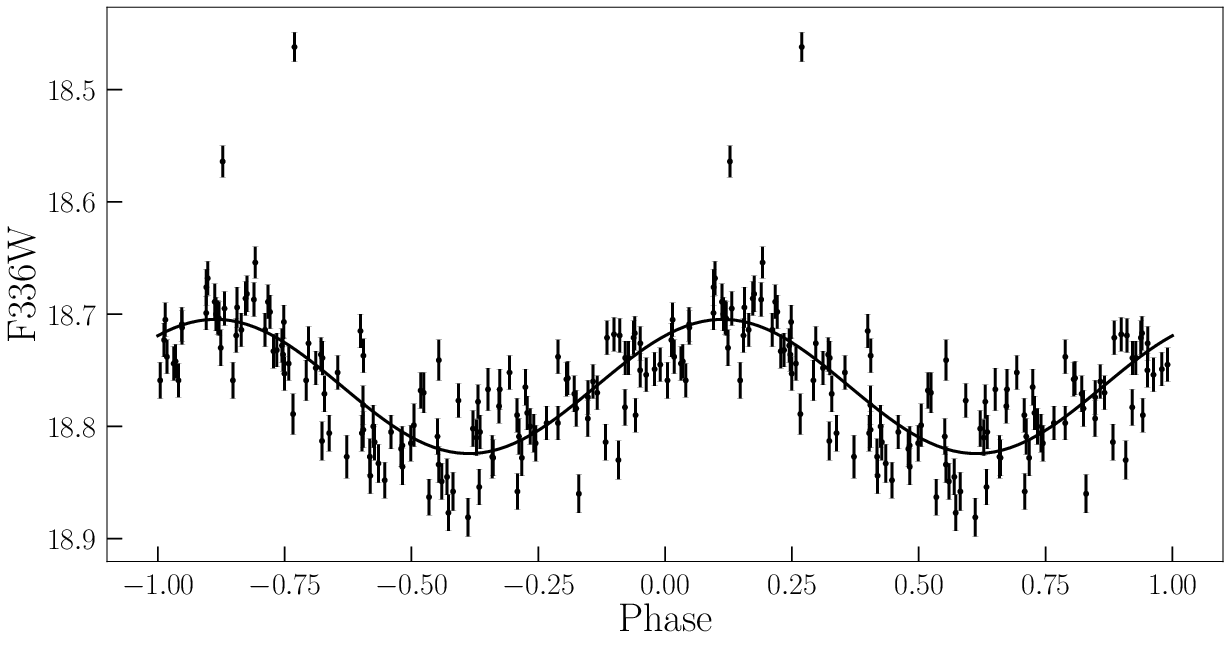
HST

Magnetic Helium Core WDs?
3- Symbiotics. TESS and KELT?
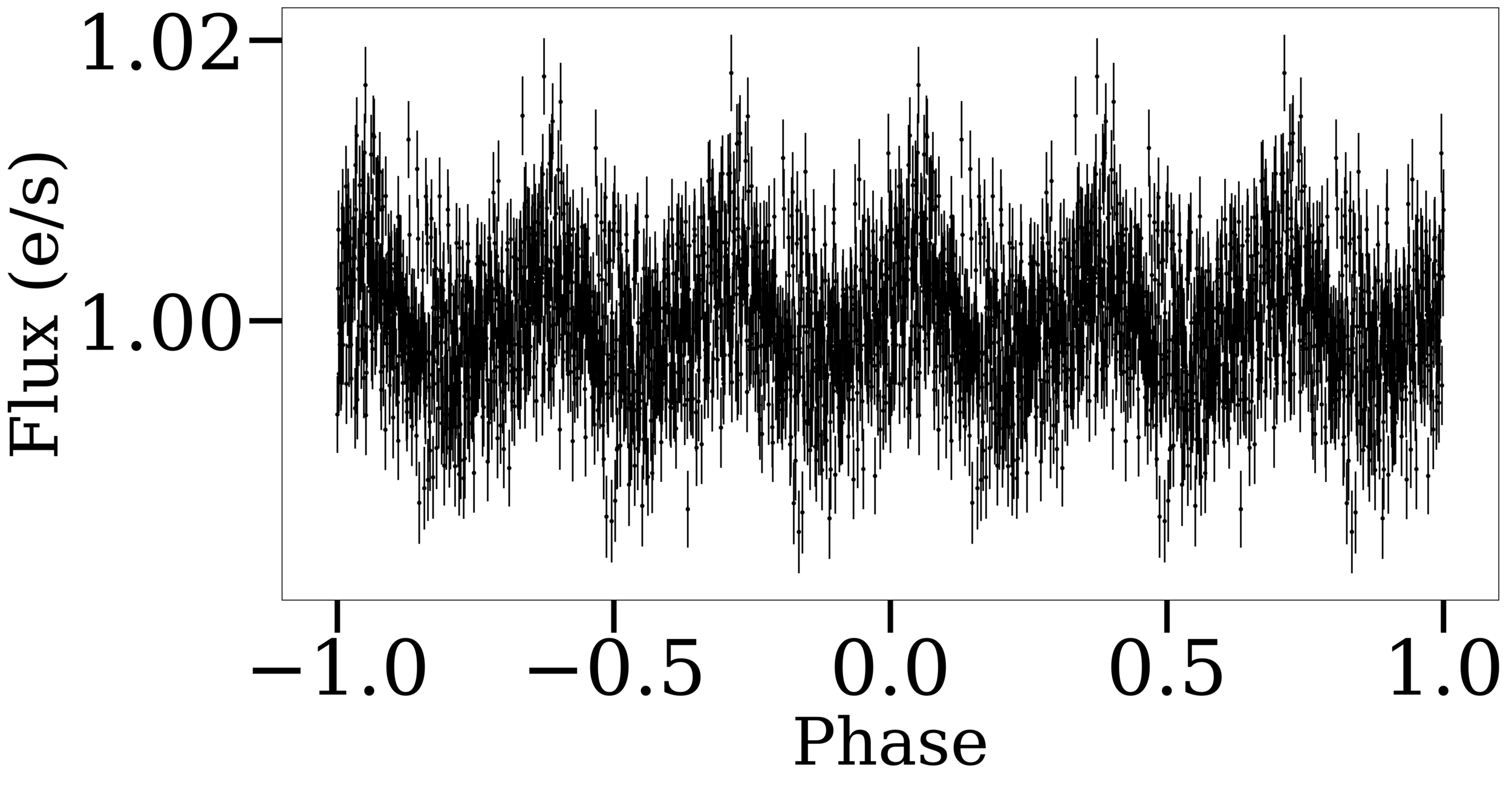

TESS

4-LC features
1-Feets
2-tsfresh
3-kats
4-hctsa
Finding CVs in X-rays and UV
-
Advantages of X-ray Searches:
- Avoid crowding
-
Disadvantages:
- Small FoV (FUV)
- Lx ≥ 1029 ergs/s
Significant X-ray bias

X-ray: NASA/CXC/CfA/J.Grindlay & C.Heinke; Optical: ESO/Danish 1.54-m/W.Keel et al.
Summary CVs in GCs
-
Few of CVs per cluster
-
X-ray biased sample:
-
Lx > 1029ergs/s
-
-
Predicted "Hidden" Population:
-
Belloni et al. (2016, 2017a, 2017b)
-
-
Dearth of DNe:
-
Only 17 confirmed
-
-
Core-collapsed:
-
Bimodal population
-
-
Period distribution?
-
~15 known periods
-
Need more detections. Need more Periods
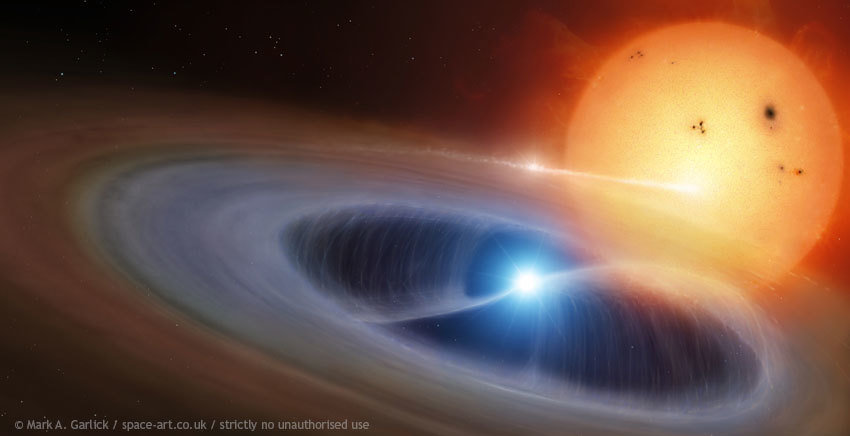
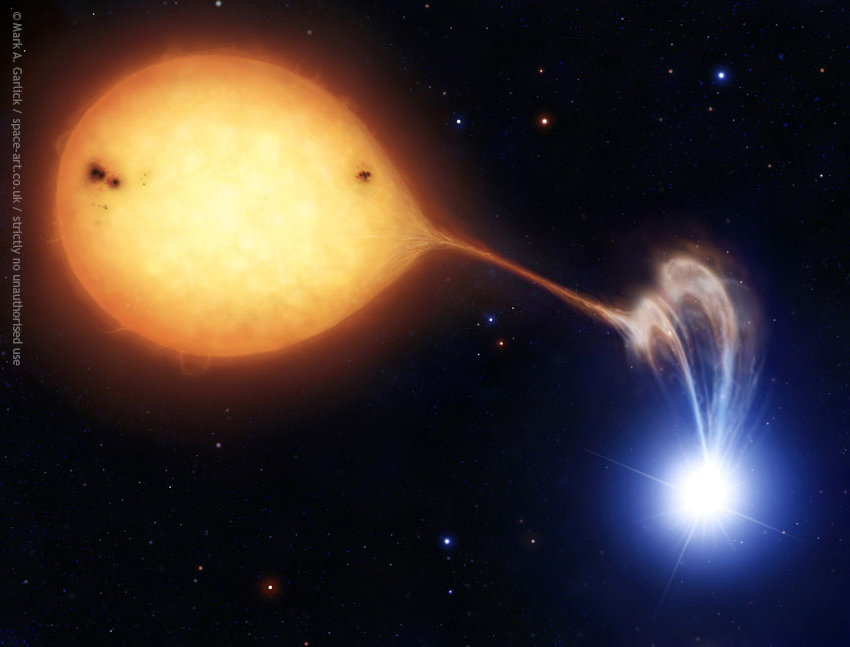
All Magnetics ?
See Belloni & Rivera Sandoval (2020) and Rivera Sandoval et al. (2024)
- HST Archive
- 7 Globular Clusters
- Many Exposures
- Different properties
- Metallicity
- Core-collapsed
- Non core-collapsed
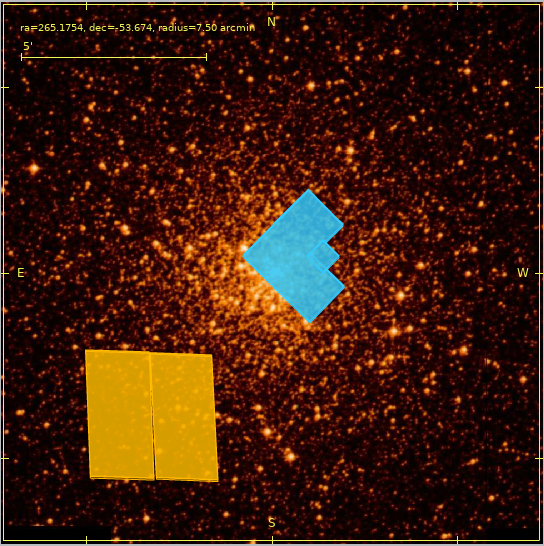
SCOVaS: Survey for Compact Objects and Variables
NGC 6397

- WFPC-2
- March-April 2005:
- 126 orbits
- F814W, F606W and F336W
- Exp time: 500-700 s
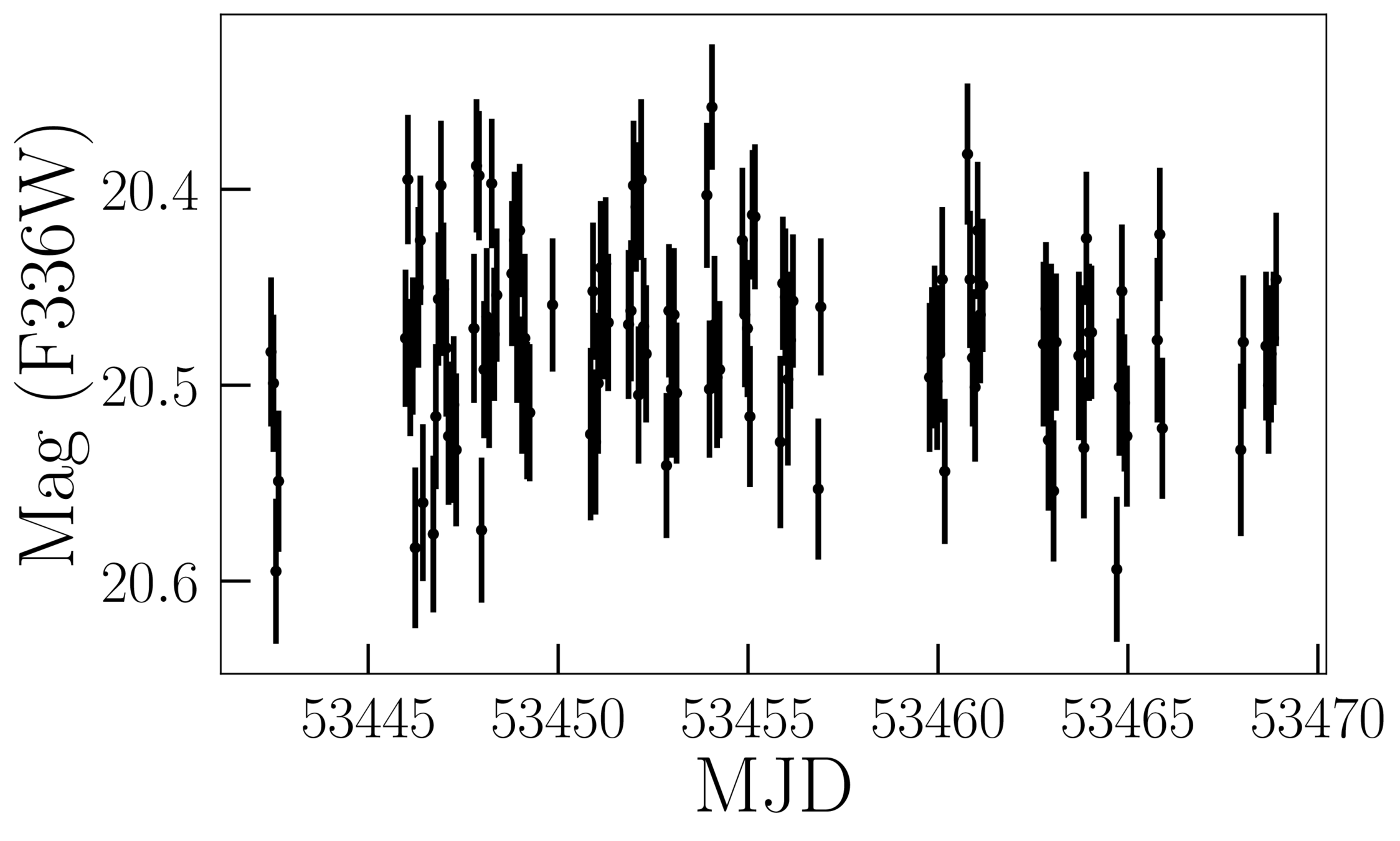
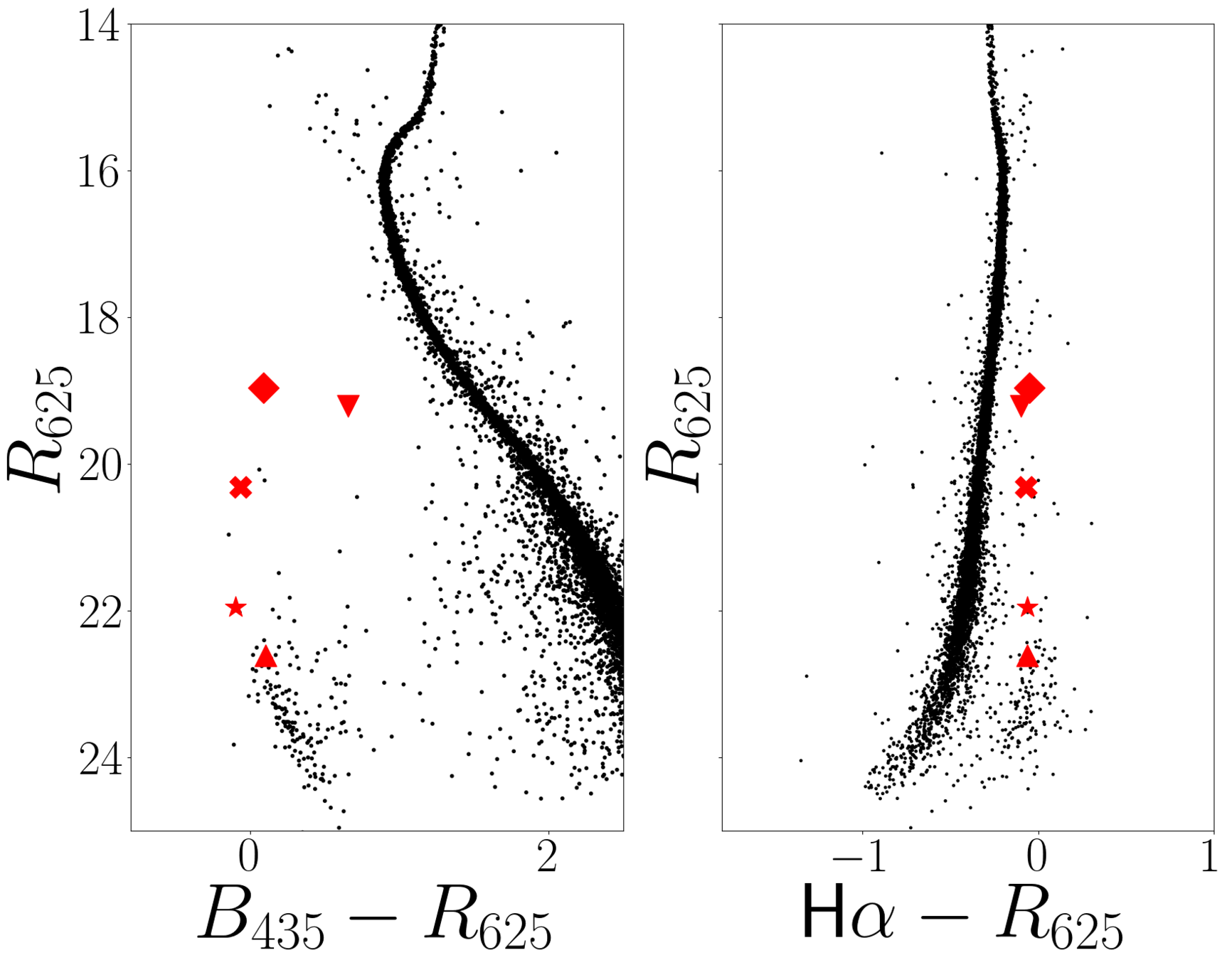
Light Curves Variable WD Candidates
5.3 hours

ESO/L. Calçada
Magnetic Fields?
To do: Finish the introduction and send it to co-authors
New To do: Finish new comments from co-authors and resend
Why it took me so long?
- I don't love writing:
- Procrastination
Future Plans:
- Submit to Journal by end of Summer?
- ESO proposal Sept, 2024
SCOVaS: Survey for Compact Objects and Variables

TESS and AM CVns

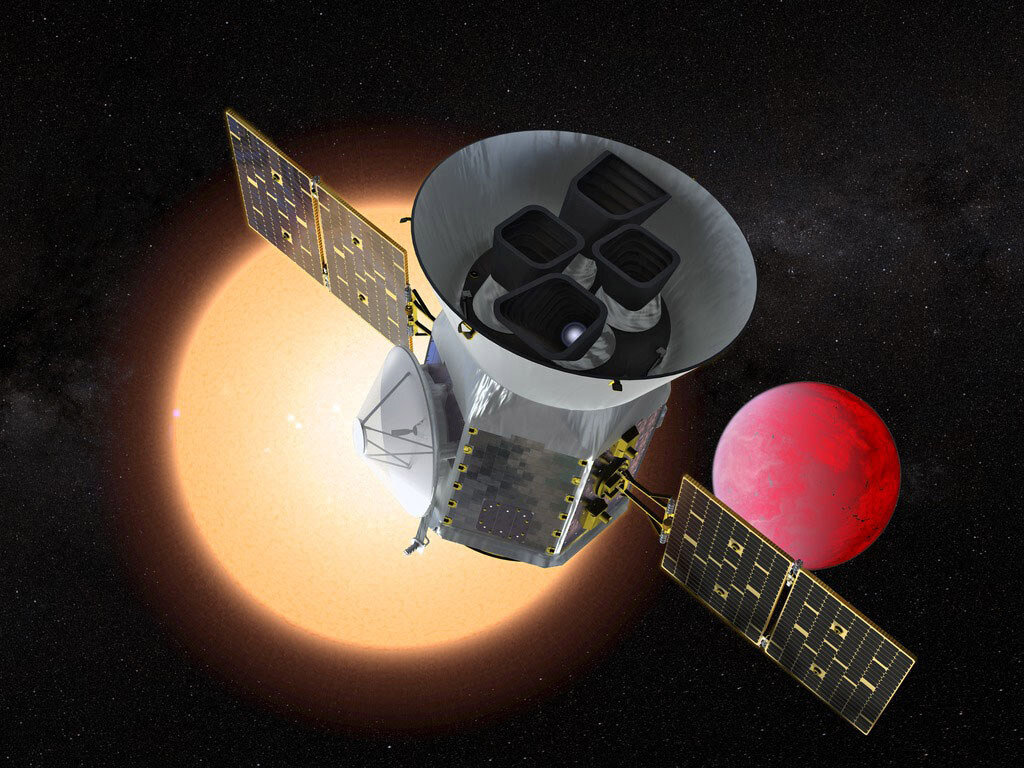
LILA and
SN

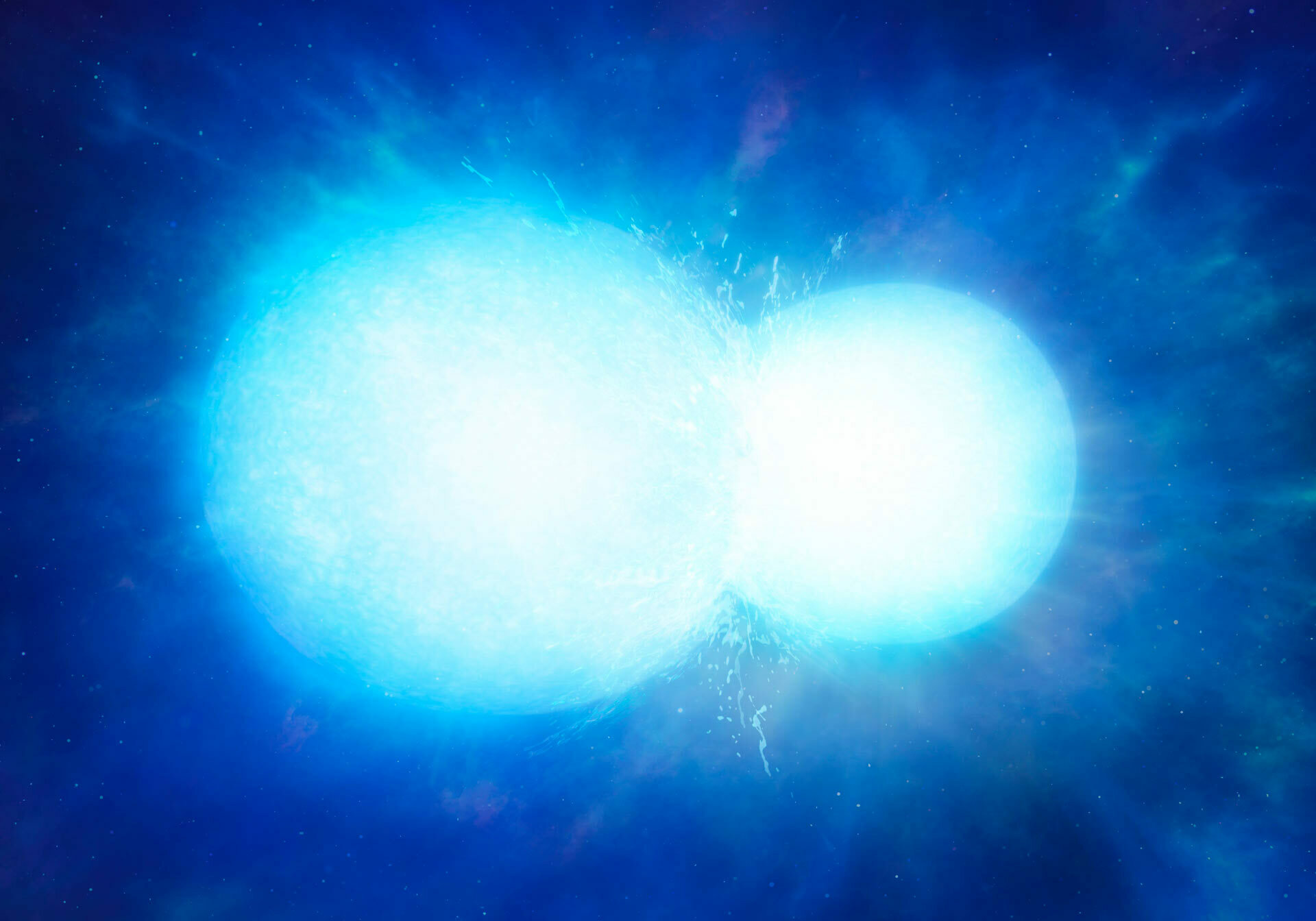
White Dwarf Mergers LILA/LISA

White Dwarf Mergers LILA/LISA

White Dwarf Mergers LILA/LISA

White Dwarf Mergers LILA/LISA
To do: SNR GLOC, LILA, etc.
Why I haven't done it?
- Very bad at multi-tasking
When I hope to do it:
- Have all the figures by Summer ?
MARES: Magnetic Remnants in Symbiotics
To do: Resubmit TESS proposal
New to Do:
- Data Analysis
- Gaussian process
Why I haven't done it?
- Other projects more intersting right now
- Bad at multi-tasking
When I hope to do it:
- I don't know
- I would love to learn about Gaussian Process for this project and others.
What is the percentage of magnetic WDs in Symbiotics? (Merc et al. 2023, Belloni et al. 2024)
Future Stuff I would love to Brainstorm
- Compact Object Population in Old Open Clusters (OOC)
- LISA Sources?
- Extremely Low Mass WDs in OOC
- Single Stellar Evolution
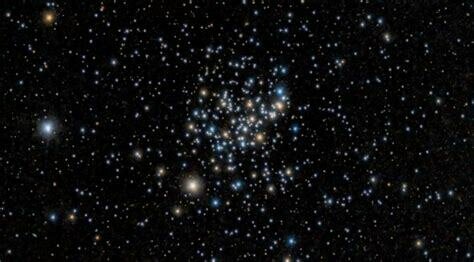
Extra
Future Stuff:
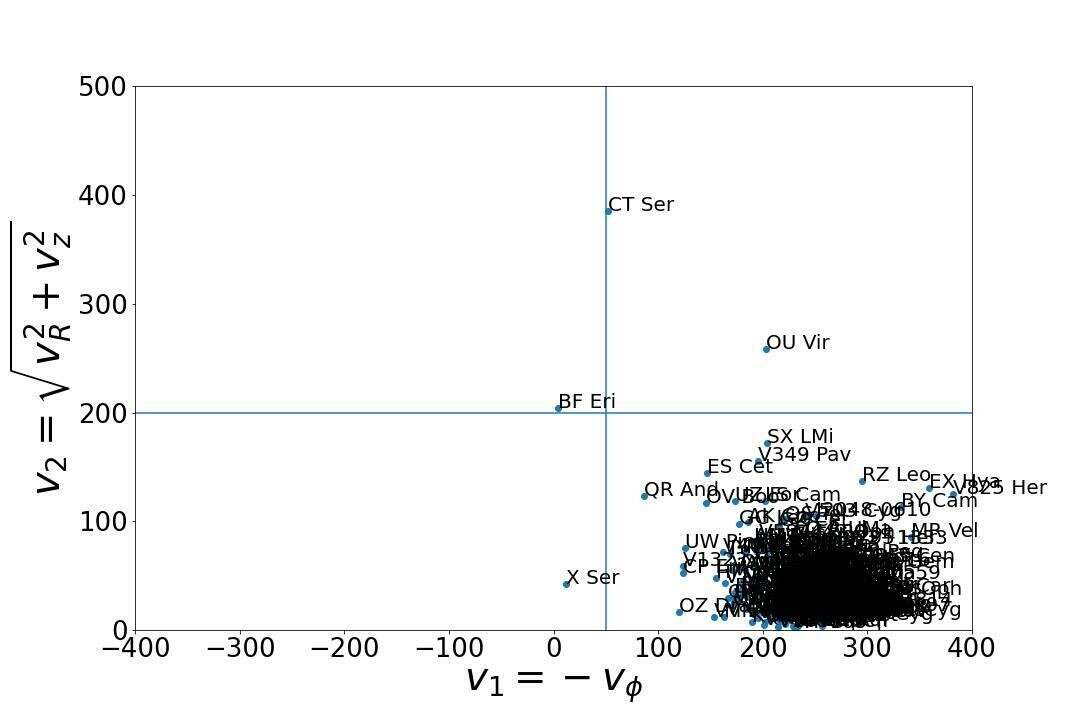
Data from Peters (2008)
- Halo vs Thick Disk:
- Halo CVs:
- Not Period Bouncers
- Halo AM CVns
- Halo CVs:
1- CVs in the Halo
2-WDs mergers in the LILA band
WDs Merger




Summary CVs in GCs
-
Few of CVs per cluster
-
X-ray biased sample:
-
Lx > 1029ergs/s
-
-
Predicted "Hidden" Population:
-
Belloni et al. (2016, 2017a, 2017b)
-
-
Dearth of DNe:
-
Only 17 confirmed
-
-
Core-collapsed:
-
Bimodal population
-
-
Period distribution?
-
~15 known periods
-
Need more detections. Need more Periods


All Magnetics ?
See Review by Belloni & Rivera Sandoval (2020) arxiv:2008.12772
-
Precursor
- TESS (Duffy et al. 2021)
-
5/6 have Precursor
- Except ASASSN-14cc

PTF1 J0719+4858
Pichardo Marcano et al. (2021)
ZTF
TESS
Precursor
Type of Super Outbursts
Osaki et al. (2005)
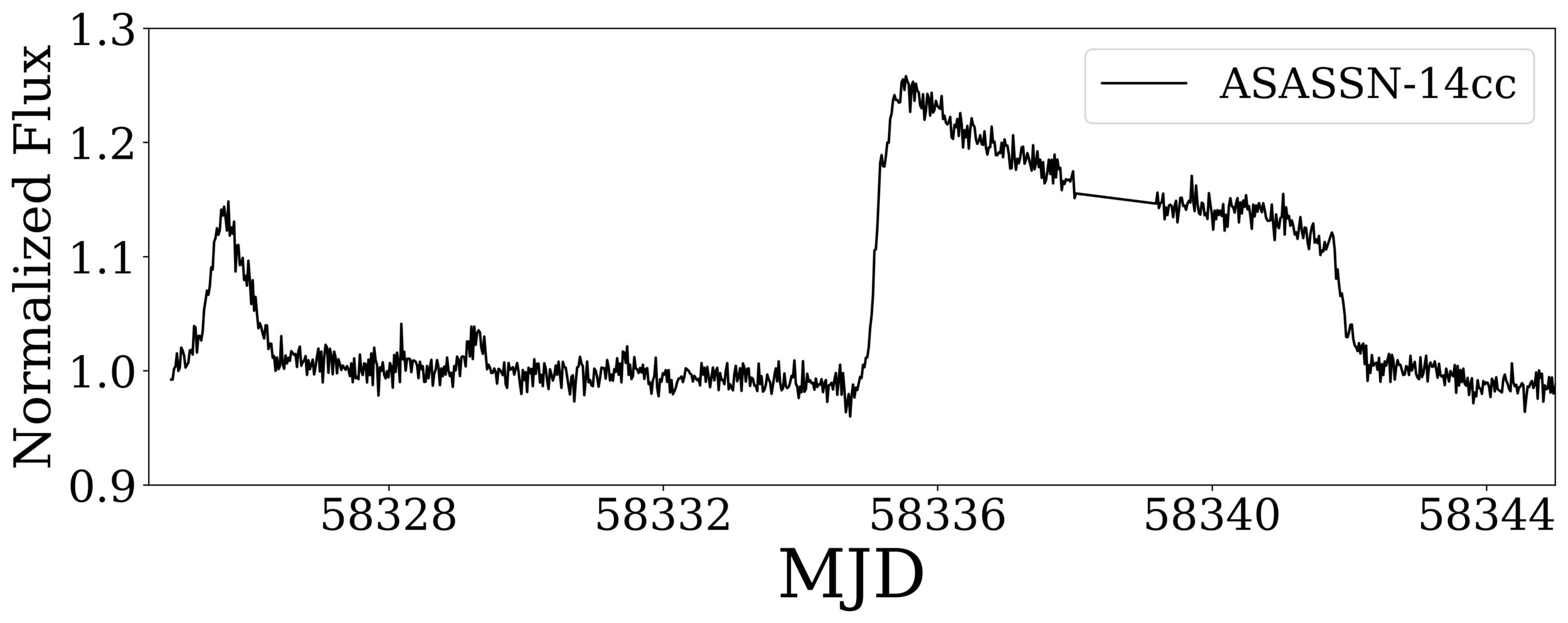

High Mass Ratio
DIM
Cataclysmic Variables

See also Duffy et al. (2021)
High Mass Ratio
High Mass Ratio
High Mass Ratio
eccentric disc develops rapidly
Type of Echo Outbursts


SDSS J1043+5632
PTF1 J0719+4858
- Porb = 28.5 min
- WZ Sge like
- Precursors
- EMT (Hameury+'20)
- Reflection:
- Hot Massive WD
- Porb = 26.7 min
- Compare to TCP J21040470+4631129
- EMT (Hameury+'20)
- Helium "SU UMa"
- EMT+TTI (Kotko+'12)
SO
rebrightening
SO
rebrightening
- Color Evolution

PTF1 J0719+4858
Pichardo Marcano et al. (2021)
ZTF
SO
NO
SO
NO
rebrightening
rebrightening
Color Evolution

PTF1 J0719+4858
-
Similar to Dwarf Novae
-
Hameury et al. (2020)
-
-
Similar SDSS J1411+4812
- Rivera Sandoval et al. (2021)
-
Compare to SDSS 1137
- Rivera Sandoval et al. (2021)
Pichardo Marcano et al. (2021)
rebrightening

SDSS J113732+405458
Enhanced mass transfer
Rivera Sandoval et al. (2021)
Porb = 26.7 min
Porb ~ 60 min
Superoutburst duration vs Porb


Pichardo Marcano et al. (2021)
Cataclysmic Variables
-
White dwarf primary
-
"Main-sequence" donor
-
Roche-lobe overflow
-
Accretion disk (non-magnetic)
-
Highly Variables:
-
Dwarf novae
-
2-8 mag outburst
-
10-100 increase in L
-
-
Looking of CVs in GCs
NASA, ESA, H. Richer and J. Heyl (University of British Columbia), and J. Anderson and J. Kalirai (STScI)

Binaries in Globular Clusters
-
Globular Clusters
- The binary population drives the dynamical evolution of GCs
-
Cataclysmic Variables:
- Large (predicted) sample at known distance
- Potentially very different from field CVs
- A lot of open questions
-
Gravitational Waves:.
- White dwarf degenerate sources for LISA
Ṁ of AM CVns:
To do: À la Schreiber et al. ('07,02) knowing the Gaia distance, calculate Ṁ and compare to models
Why I haven't done it?
- Still not sure how
- Time
When I hope to do it:
- Before Euro WD Conf. July 8th to 12th
Finding CVs in X-rays and UV
-
Advantages of X-ray Searches:
- Avoid crowding
-
Disadvantages:
- Small FoV (FUV)
- Lx ≥ 1029 ergs/s
Significant X-ray bias

X-ray: NASA/CXC/CfA/J.Grindlay & C.Heinke; Optical: ESO/Danish 1.54-m/W.Keel et al.
Summary CVs in GCs
-
Few of CVs per cluster
-
X-ray biased sample:
-
Lx > 1029ergs/s
-
-
Dearth of DNe:
-
Only 17 confirmed
-
-
Core-collapsed:
-
Bimodal population
-
-
Non core-collapsed:
-
1 faint population
-
-
Period distribution?
-
16 known periods
-
Need more detections. Need more Periods


All Magnetics ?
- HST Archive
- 7 Globular Clusters
- Many Exposures
- Different properties
- Metallicity
- Core-collapsed
- Non core-collapsed

SCOVaS: Survey for Compact Objects and Variables
Preliminary Results
NGC 6397
- Closest Core Collapse
- Second Closest
- 2.4 kpc
- 15 CV candidates
- 2 Pulsars
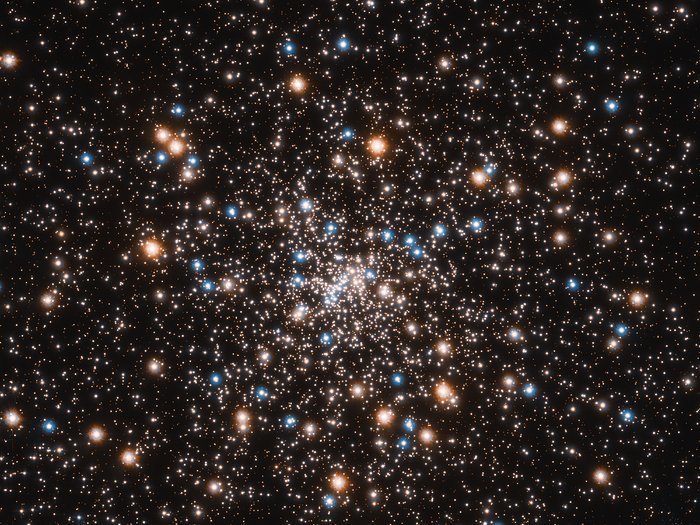
Preliminary Results
NGC 6397

Where are all the CVs?

We haven't found new
X-ray faint CVs
Spoiler Alert!
Other Binaries
Credits: NASA/Rivera Sandoval
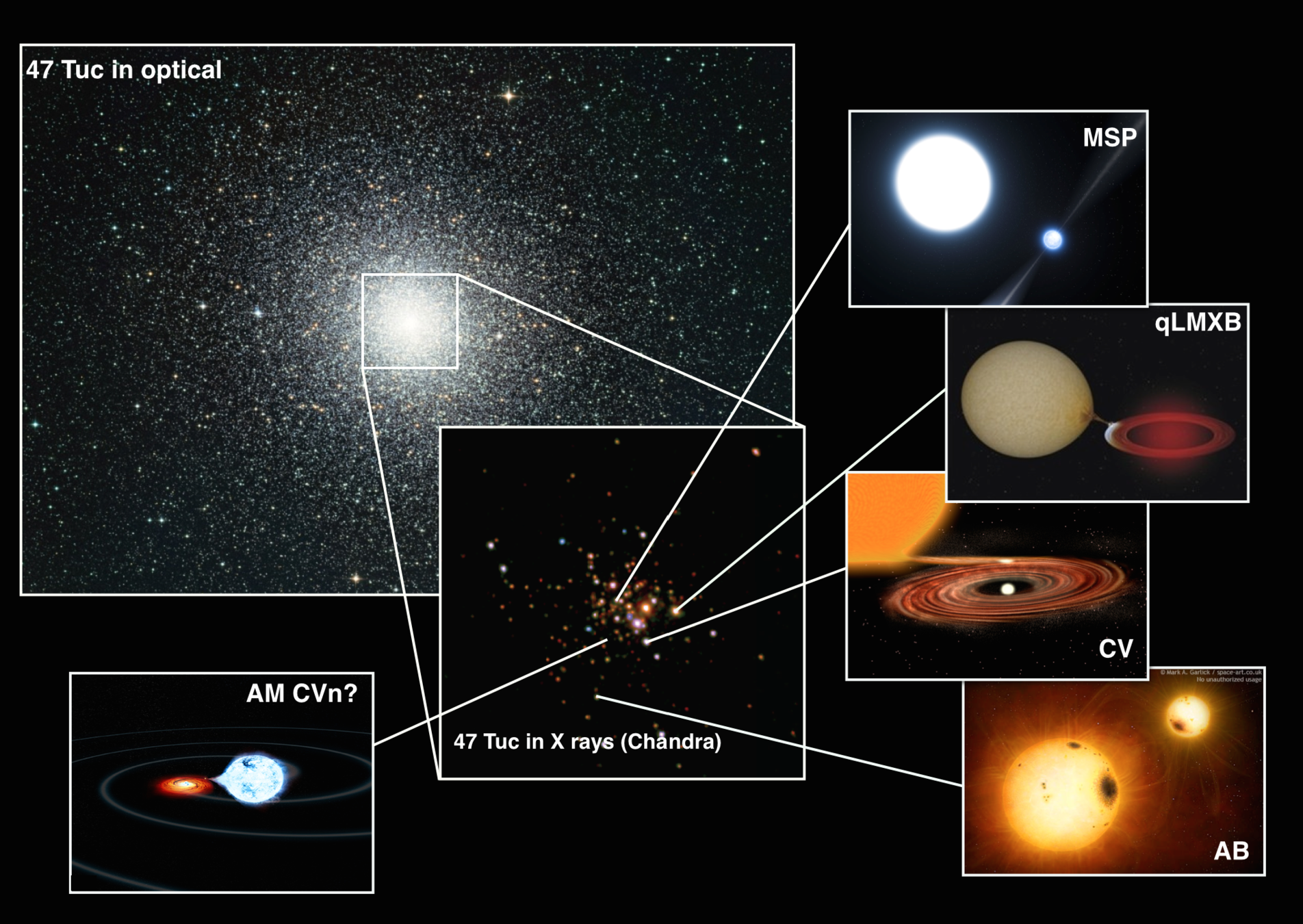
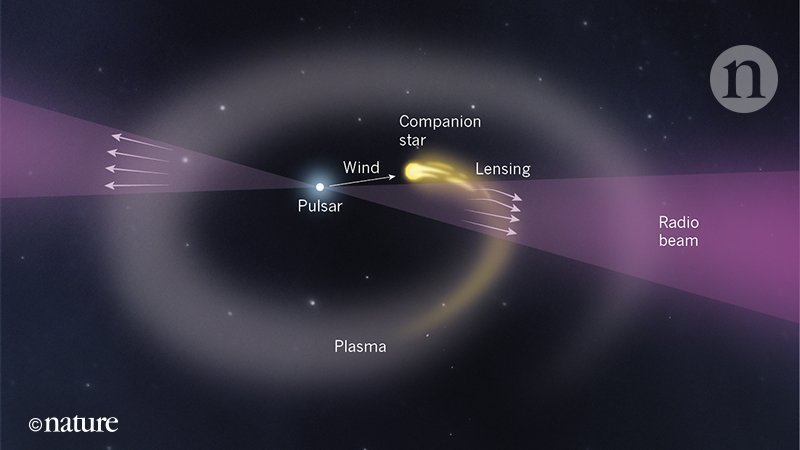
Main et al 2018 (Nature)
Redback 'spider' Pulsar
Redback Pulsar
A new candidate Redback MSP

Pichardo Marcano et. al (2021a)
- Porb 1.96 days
- Longest Porb for Redback in GCs
- Missed MSP in Pulsar Searchers
- Confirmed by Zhang et al. (2022)
Magnetic He WD Candidate
- Vrad > 150 km/s (MUSE)
- Not Detected in X-rays
- Lx < 1028 ergs/s
- Roche-lobe filling stripped star?
- M~ 2 x 10-4 ☉

-
18.4 hours
Rotational Period

ESO/L. Calçada
Please talk to me about:
(Things I want to learn more about)
-
Compact Binaries/Binary Evolution:
- White Dwarfs Binaries and LISA
- Common Envelope
- Stripped Stars (e.g. sdB, WR, ...)
- Products of Binary Evolution (e.g. Barium Stars, R CrB, ELMs ...)
- Halo vs Thick Disk Population (Gaia):
- Star Clusters (GCs ):
- LISA background
- WD binaries in GCs (Binary Evolution)
- Time-Series Analysis:
- Methods:
- Gaussian Process
- Flickering/QPOs/Magnetism in Symbiotics
- Classification (unsupervised):
- Dynamic time warping/The information bottleneck method
- Where are all the AM CVns?
- Gaussian Process
- Methods:





Also interested in:
- TESS:
- Transients
- Crowding
- Symbiotics
- Halo vs Thick Disk:
- Halo CVs
- Halo AM CVns?

Data from Peters (2008)
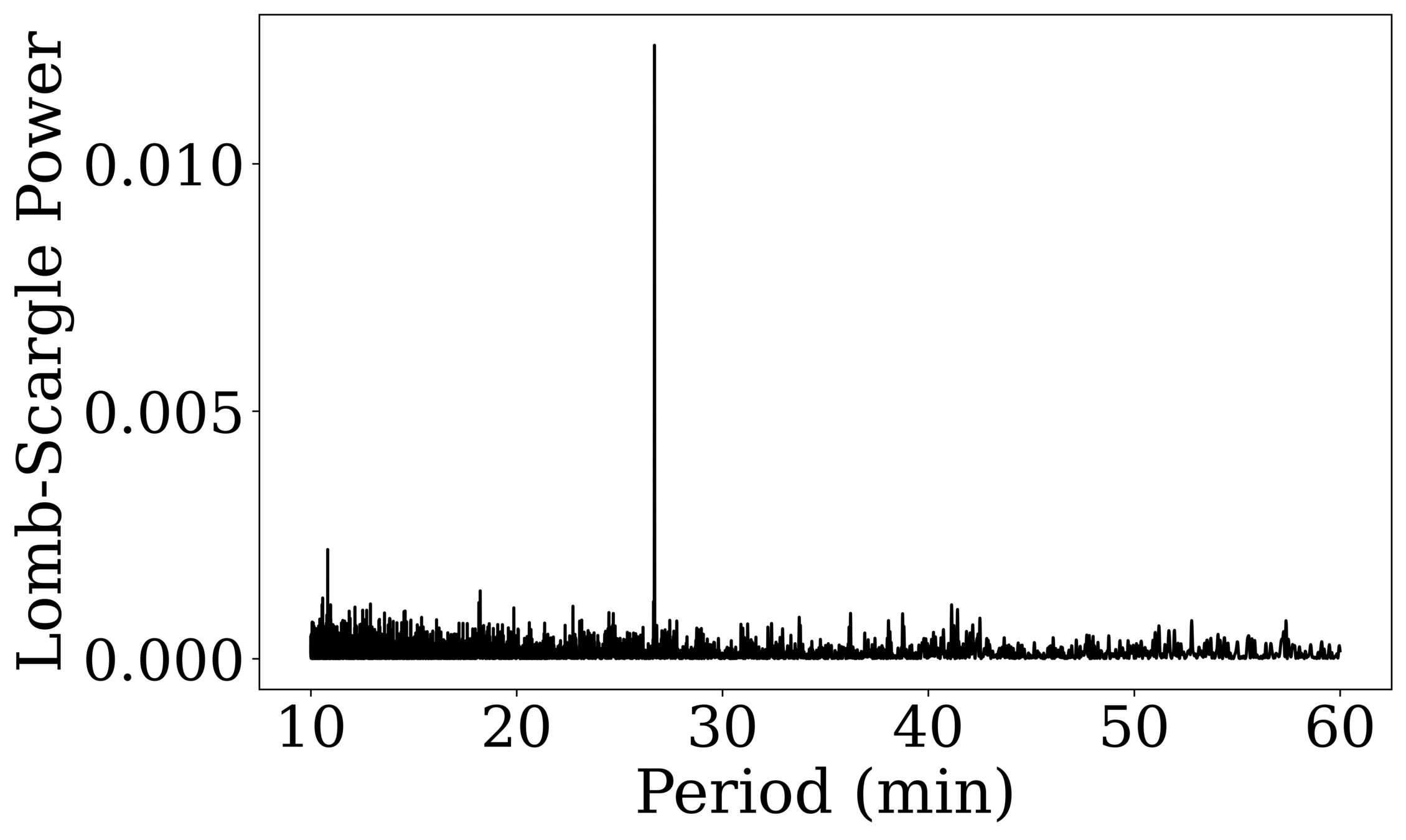
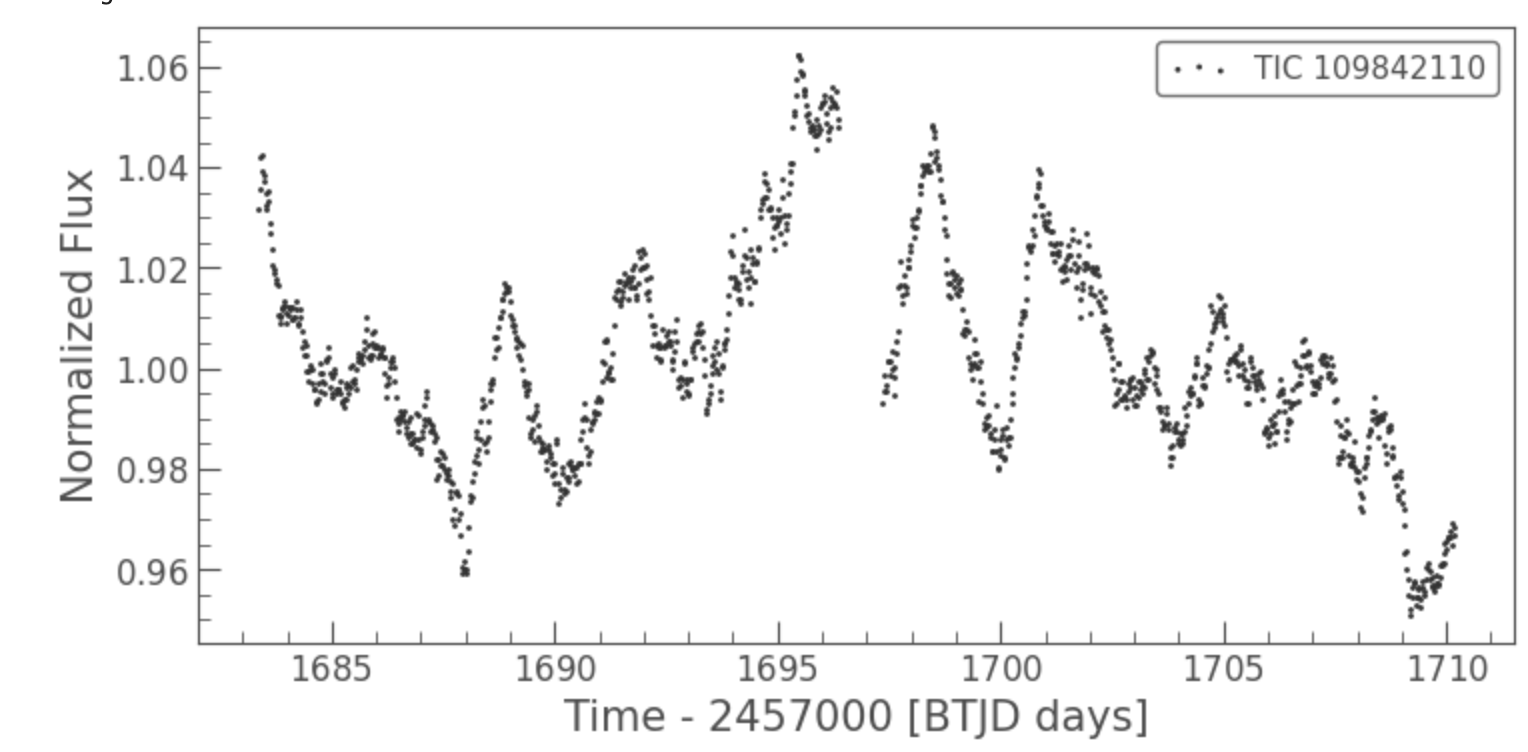
Blue Variables
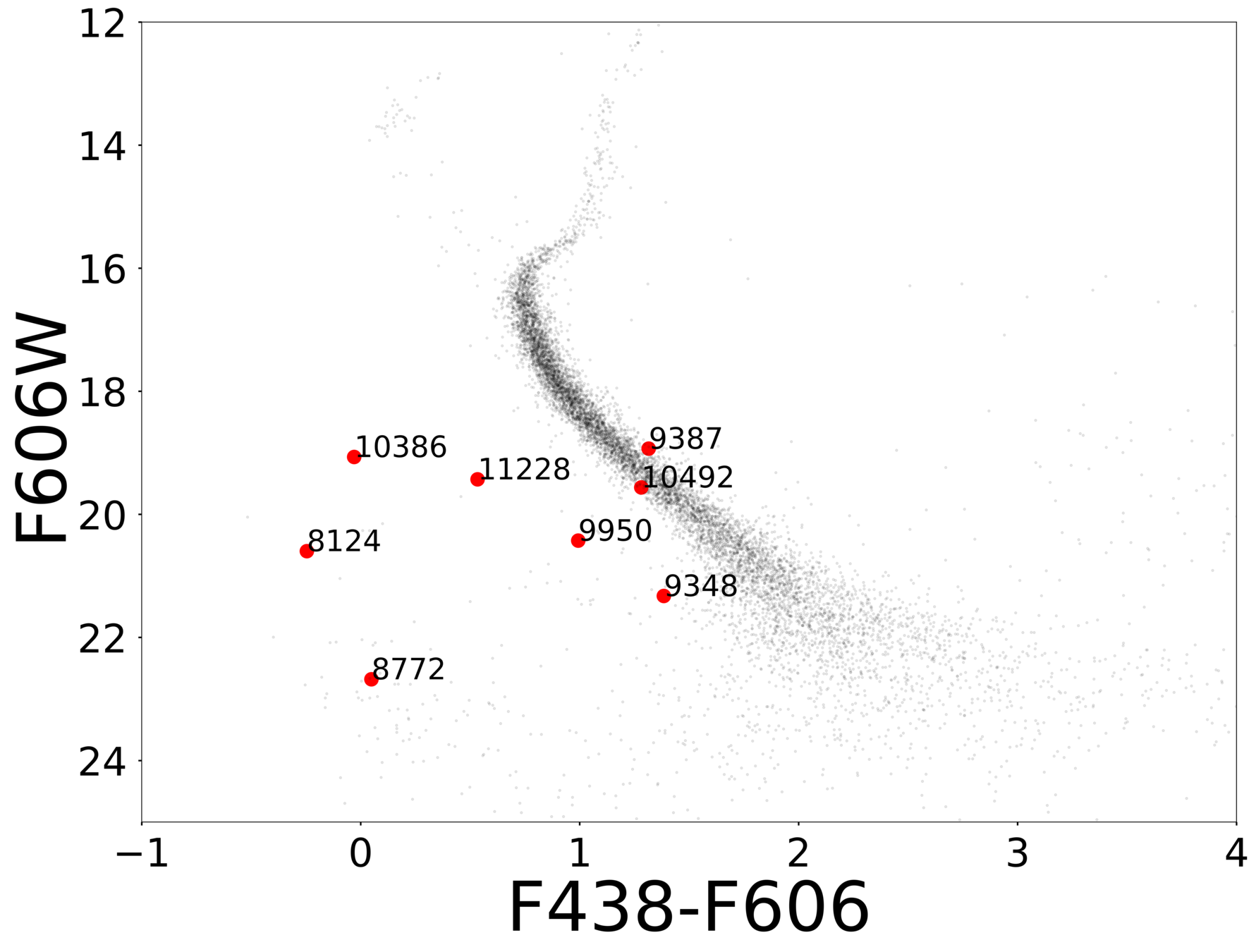
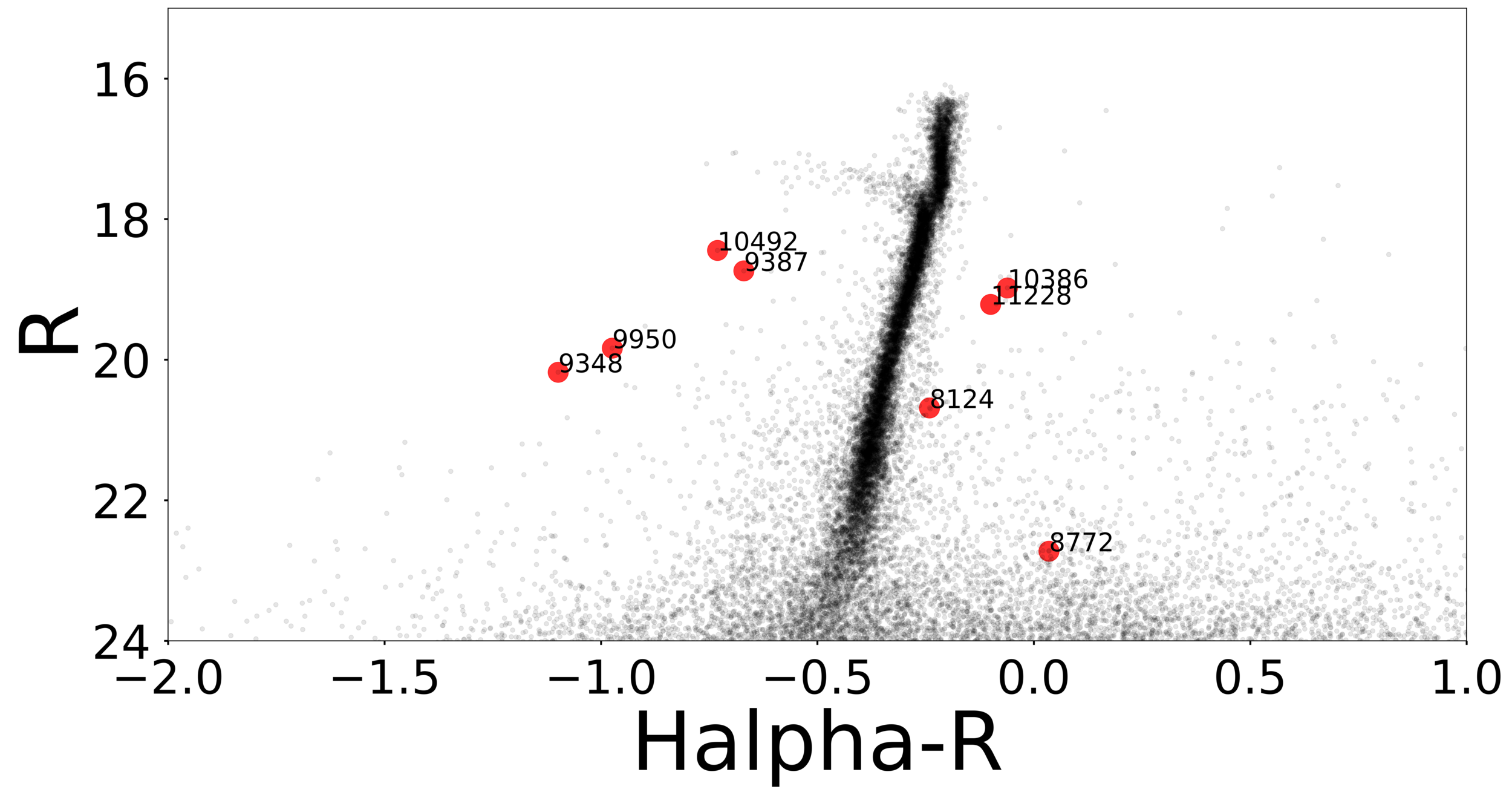
- Periodicity Search:
- Lomb-Scargle
- Phase Dispersion Minimization
- False Alarm Probability < 10-8
NGC 6397

- Pipeline to find interesting objects:
- CMD Position and Periodicity/Variability Searches
- We were able to recover all known CV Candidates
- Found Orbital Period Redback Pulsar
- Detached White Dwarf-Red Dwarf
- First Magnetic He Core WD in GCs
- Many more variables to analyze...
Where are all the CVs?

Preliminary Results
M 92
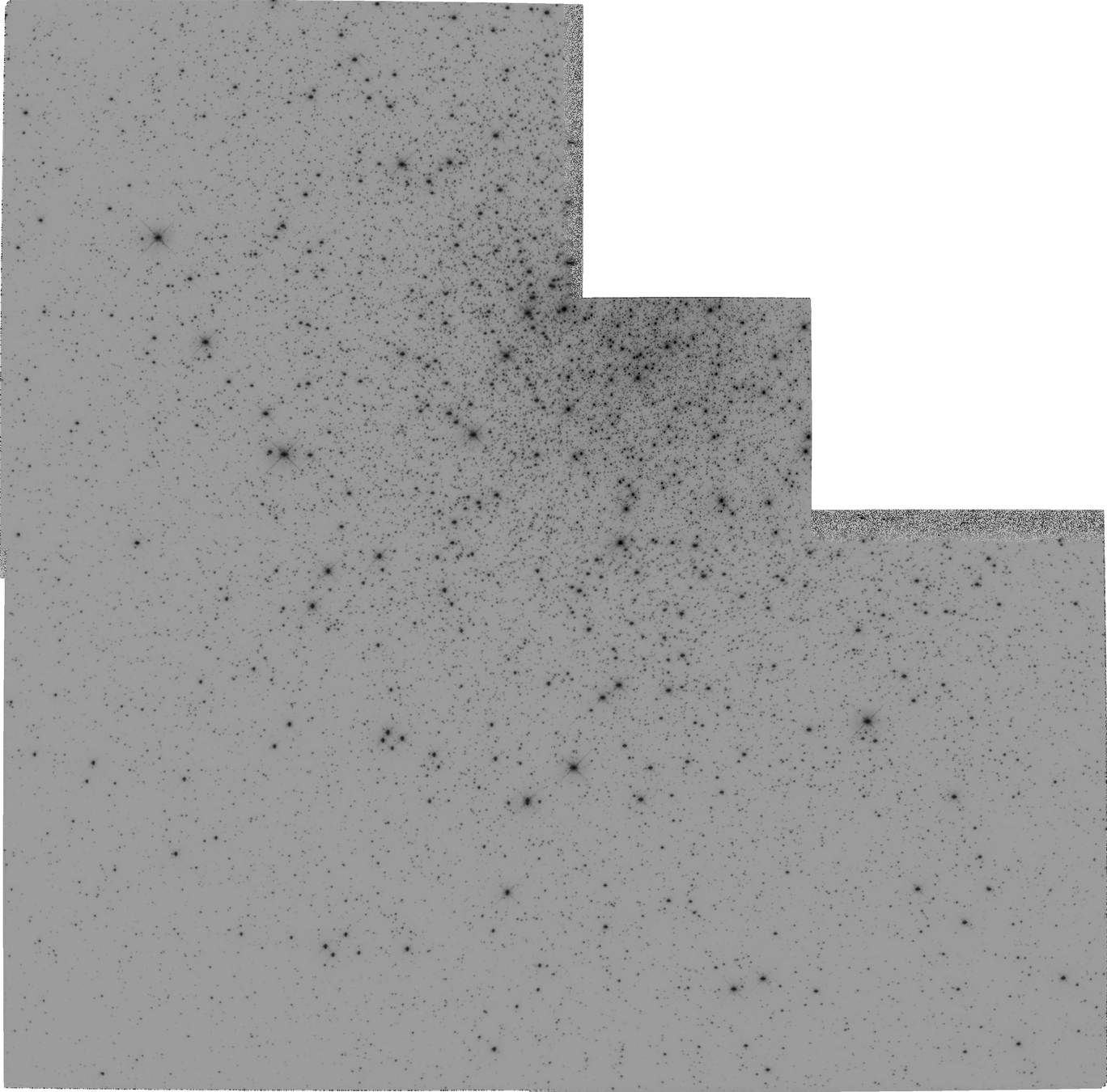
- WFPC-2
- 2008-01-25 to 2008-01-30:
- 76 Exposures
- F555W
- Exp time: 10 s
Preliminary Results
NGC 6397

- WFPC-2
- March-April 2005:
- 126 orbits
- F814W, F606W and F336W
- Exp time: 500-700 s
He WD Candidate
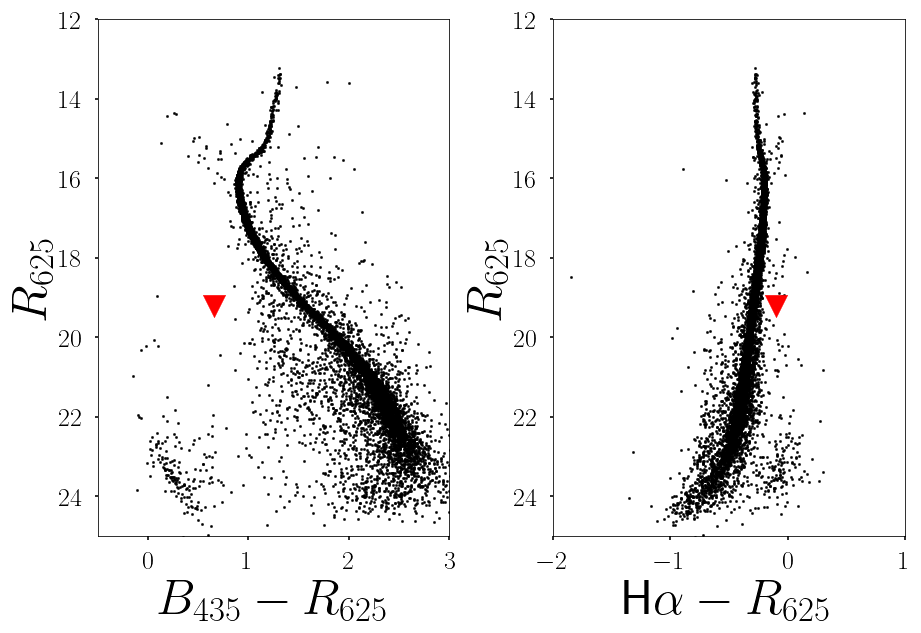
Pichardo Marcano et al. (2023)
HACKS CMD
Data: Libralato et al. (2022)
Also interested in:
- Magnetic White Dwarfs:
- A Magnetic Extremely Low-Mass WD in a Globular Cluster?
- Magnetic WDs in Symbiotics from TESS:
- Spin-up?
- Spin-up?

Data from Peters (2008)

-
18.4 hours
- Halo vs Thick Disk:
- Halo CVs:
- Not Period Bouncers
- Halo AM CVns
- Halo CVs:
Pichardo Marcano et al. (2023)
Z And
28 min to 26.7 min in 20 Yr

BF Cyg (88 min)
He WD Candidate
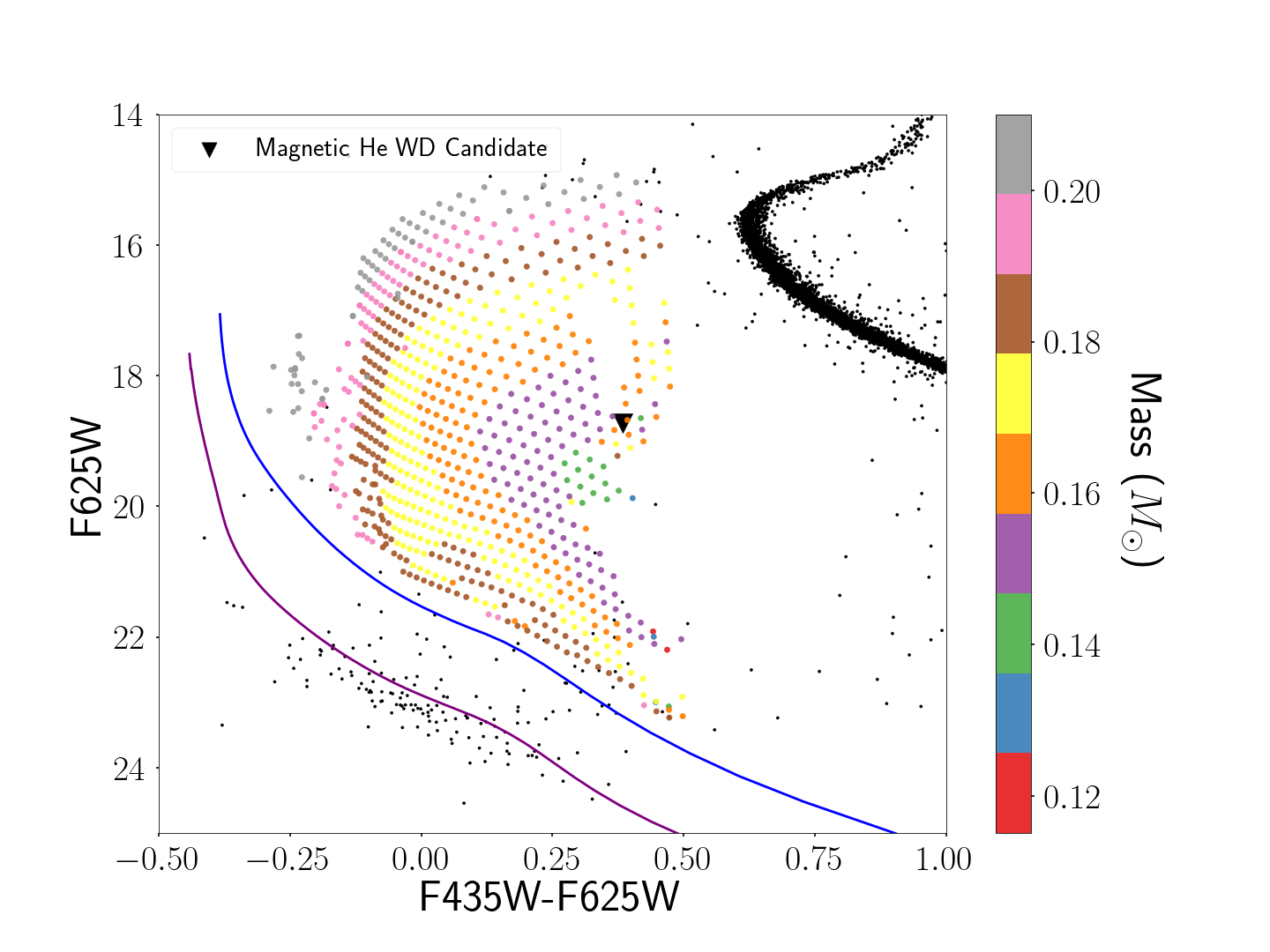
Tracks from Althaus et al. (2009)
0.16 M☉
0.22 M⊙
0.52 M⊙

-
18.4 hours


He WD Candidate
Magnetic He WD Candidate
- Binary: Vrad > 150 km/s (MUSE)
- Not Detected in X-rays
- Lx < 1028 ergs/s
- Not an Roche-lobe filling stripped star
- M~ 2 x 10-4 ☉

-
18.4 hours
Rotational Period

ESO/L. Calçada
He WD Candidate
Pichardo Marcano et al. (2023)
MUSE spectrum
Data from Husser et al. (2016), Kamman et al. (2016)
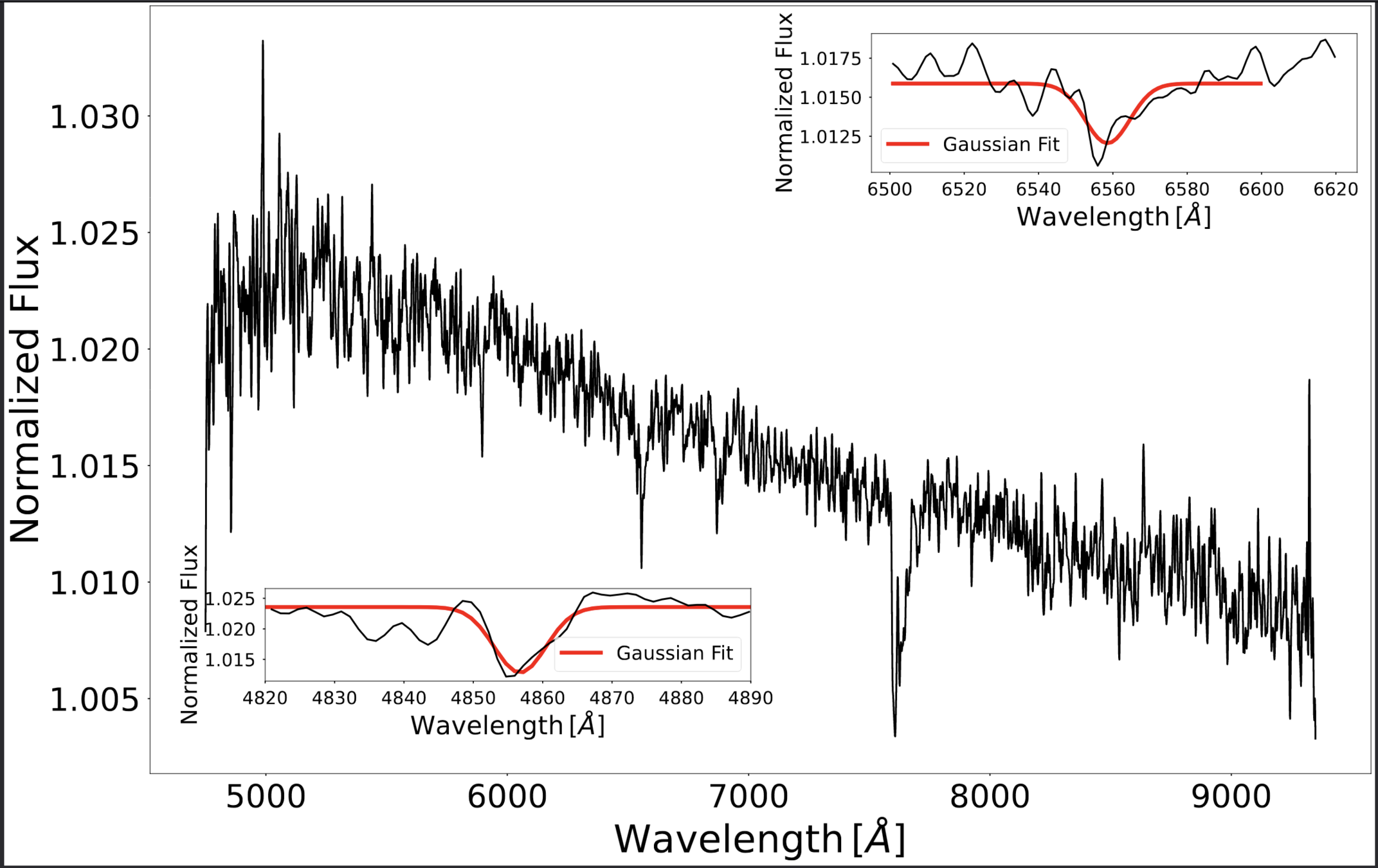
-
5.3 hours
Variable and No Hα Excess

- Not Detected in X-rays
- 0.2 Δmag in F336W
- No Hα in Excess
- Periodicity
5.3 hours

Variable WD Candidate
Pichardo Marcano et al. (in prep.)
HUGS CMD
Data: Piotto et al.(2015)/ Nardiello et al. (2018)

Variable WD Candidate
Pichardo Marcano et al. (in prep.)
HUGS CMD
Data: Piotto et al.(2015)/ Nardiello et al. (2018)
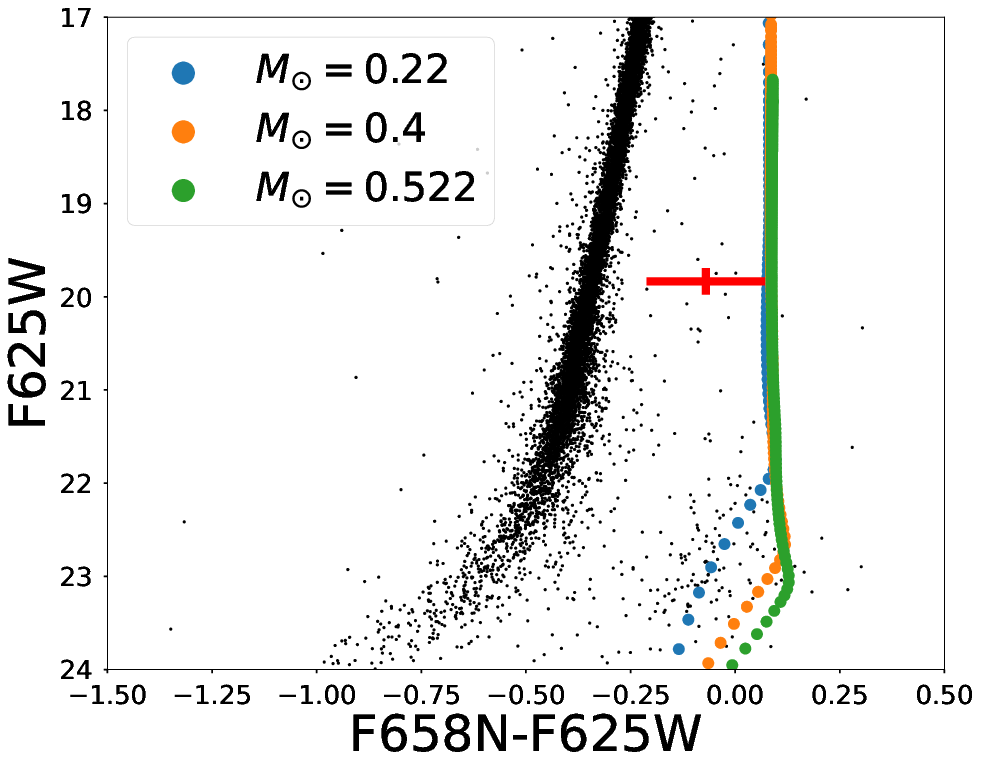
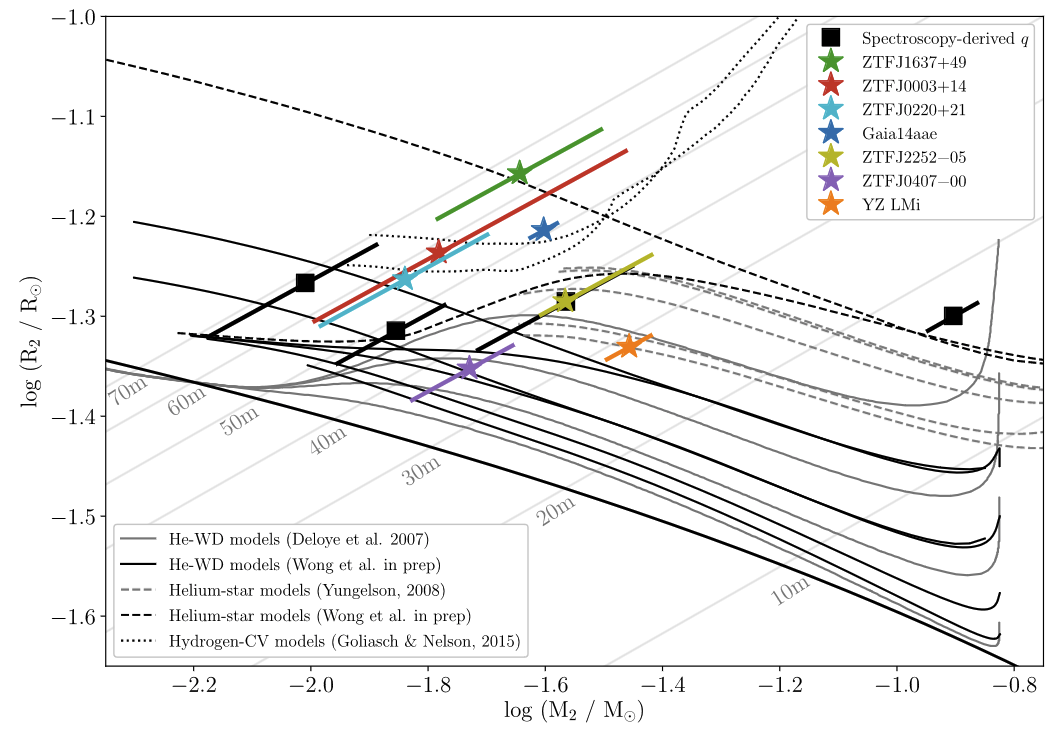
AM CVn Donors
van Roestel et al. 2022
q = M2/M1
0.0125 < q < 0.18
M2 = Donor
AM CVn Donors
Coleman et al. 2018

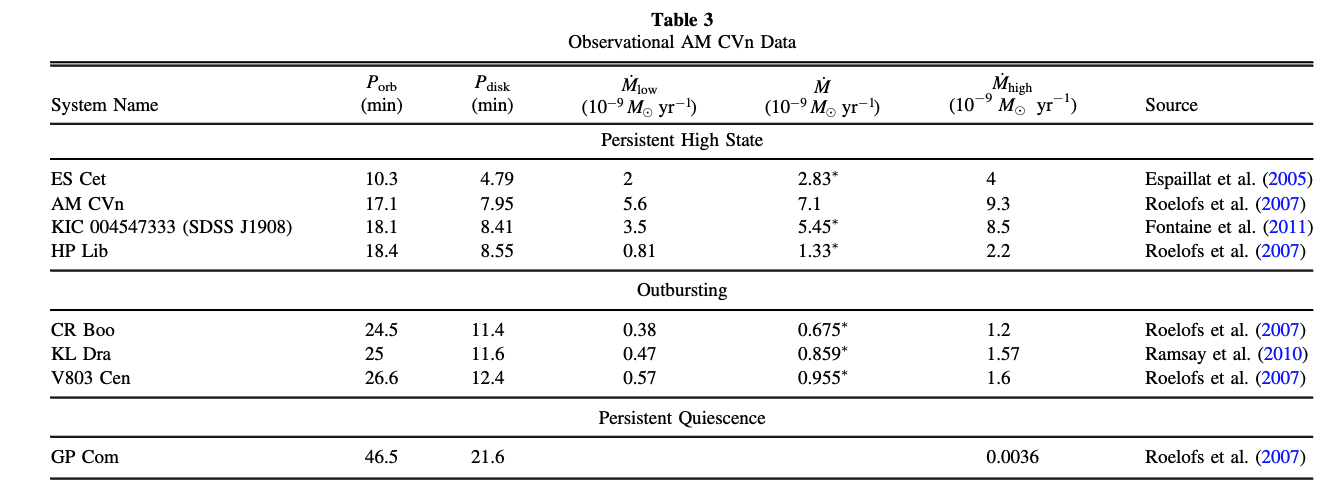
0.0125 < q < 0.18
<Rd> ~1010cm
q = M2/M1
AM CVn Donors
Coleman et al. 2018

0.0125 < q < 0.18
<Rd> ~1010cm
q = M2/M1
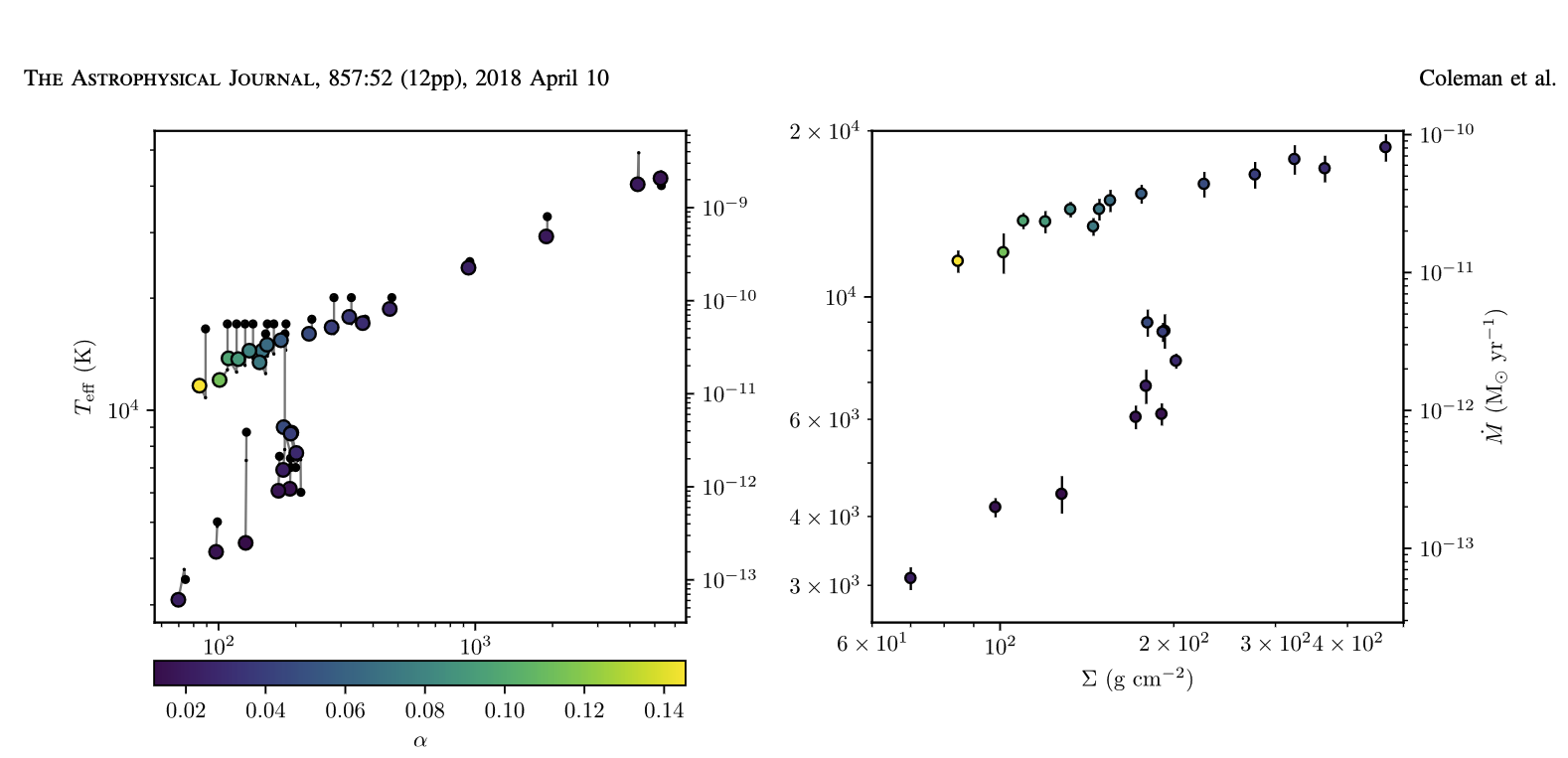

Mass-transfer rates vs orbital period

Mass-transfer rates vs orbital period

Magnetic He WD Candidate

Pichardo Marcano et al. (2023)
-
18.4 hours
-
0.16 M☉
- 0.24 R☉
- 0.11 Gyr
- Teff 7586 K
- log g = 4.9
Other work with Accreting WDs
-
Follow-up eROSITA transient:
- TESS time series analysis
-
-
Atel: Pichardo Marcano (2020)
-
Paper: Schwope, [...], Pichardo Marcano, et al. (2021)
-
Caltech

Compact Binaries Surveys
2- SCOVaS: Survey for Compact Objects and Variables
Pichardo Marcano et al. (2021a)
Pichardo Marcano et al. (2023)
Pichardo Marcano et al. (in prep.)
1- TACOS: TESS AM CVn Outbursts Survey
Pichardo Marcano et al. (2021b)
Caltech
NASA
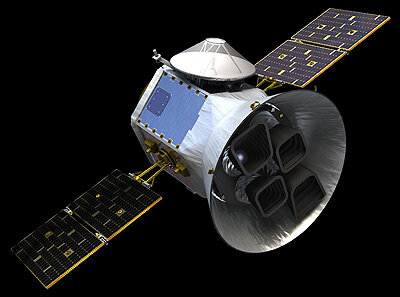



- Color Evolution

PTF1 J0719+4858
Pichardo Marcano et al. (2021)
ZTF
SO
NO
SO
NO
rebrightening
rebrightening
- Precursor
- Echo Outbursts
- DIM with Enhanced Mass Transfer (e.g. Hameury & Lasota 2021)
SDSS J1043+5632
ZTF
TESS

- Precursor
- Echo Outbursts
- DIM with Enhanced Mass Transfer (e.g. Hameury & Lasota 2021)
SDSS J1043+5632
ZTF
TESS

PTF1 J0719+4858:
-
Similar to Dwarf Novae:
- Hameury et al. (2020)
- Rivera Sandoval et al. (2021)
Color Evolution
Pichardo Marcano et al. (2021)

Accreting White Dwarf Binaries

Cataclysmic Variables

AM CVn
- Main Sequence Star
- Porb ~ 80 min - 10 hours
- Outbursts:
- 2-20 days
- Disk instability model+ (DIM)
- >1000 in the galactic field
- Predicted large # in old Star Clusters
- White Dwarf/Helium Star
- Porb ~ 5 - 70 min
- Outburts:
- weeks?
- DIM?
- ~70 in the galactic field
Mark A. Garlick
Caltech
Color Evolution

PTF1 J0719+4858
-
Similar to Dwarf Novae
-
Hameury et al. (2020)
-
-
Similar SDSS J1411+4812
- Rivera Sandoval et al. (2021)
-
Compare to SDSS 1137
- Rivera Sandoval et al. (2021)
Pichardo Marcano et al. (2021)
rebrightening

SDSS J113732+405458
Enhanced mass transfer
Rivera Sandoval et al. (2021)
Color Evolution

PTF1 J0719+4858
SDSS J113732+405458
Enhanced mass transfer
- Similar to Dwarf Novae
-
Hameury et al. (2020)
-
- Similar SDSS J1411+4812
- Rivera Sandoval et al. (2021)
- Compare to SDSS 1137/SDSS 0807
- Rivera Sandoval et al. (2021)
Pichardo Marcano et al. (2021)

Rivera Sandoval et al. (2021)
AM CVns
- Helium Rich and Know to go into outburts

Kupfer et. al (2013)

Duffy et. al (2021)
Normal Outbursts
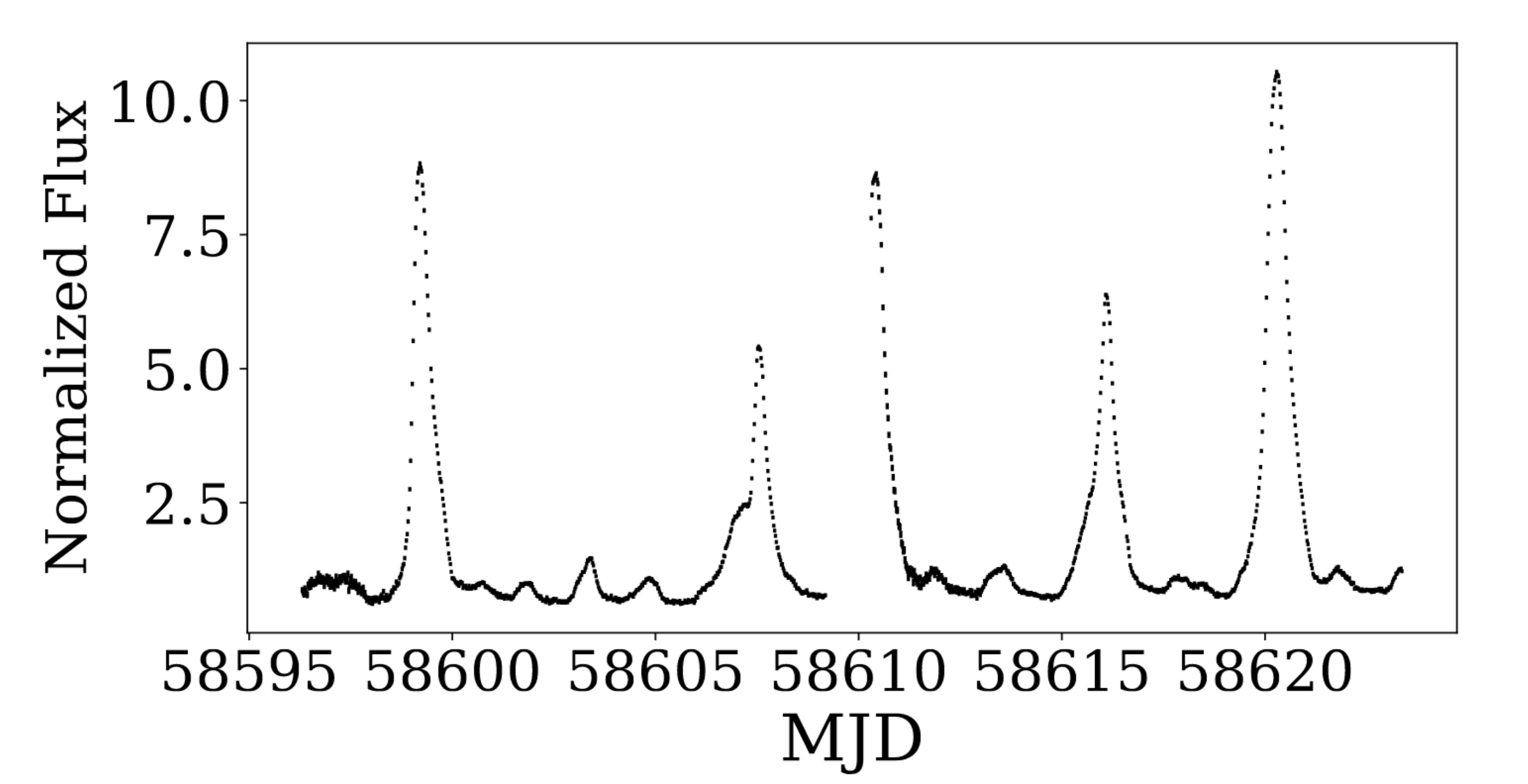
V803 Cen
- WZ Sge like ?
- Precursors
- EMT (Hameury+'20)
- Massive WD?
- Compare to TCP J21040470+4631129
- EMT (Hameury+'20)
- Helium "SU UMa"
- EMT+TTI (Kotko+'12)

AM Canum Venaticorum AM CVn
-
White dwarf + White dwarf
-
White dwarf + He Star
-
Orbital Period: 5-70 minutes
-
Rare: 70 Galactic field
Caltech

Caltech
-
Porb 20 to ~ 60 minutes (?)
-
Superoutburts (SO) and "Normal" outbursts (NO)
-
Disk instability model (DIM)
-
Constant Mass transfer rate
-
Tidal-thermal disk instability model
-
SO: Superhumps (periodic brightness variation )
-
-
Outbursting Systems
AM CVns
- Helium Rich and (some) known to go into outbursts

Kupfer et. al (2013)

Duffy et. al (2021)
Color Evolution


PTF1 J0719+4858
SS Cyg
Cataclysmic Variable
Hameury et al. (2020)
- Similar to Dwarf Novae
-
Hameury et al. (2020)
-
- Similar SDSS J1411+4812
- Rivera Sandoval et al. (2021)
- Compare to SDSS 1137/SDSS 0807
- Rivera Sandoval et al. (2021)
Pichardo Marcano et al. (2021)
rebrightening
Type of Super Outbursts
Osaki et al. (2005)


High Mass Ratio
DIM
Cataclysmic Variables
- Evolution Superhump
Pichardo Marcano et al. (2021)

Caltech
-
Porb 20 to ~ 60 minutes (?)
-
Superoutburts (SO) and "Normal" outbursts (NO)
-
SO: Superhumps (periodic brightness variation )
-
-
Disk instability model (DIM)
-
Constant Mass transfer rate
-
Tidal-thermal disk instability model
-
Outbursting Systems

Caltech
-
Porb 20 to ~ 60 minutes (?)
-
Superoutburts (SO) and "Normal" outbursts (NO)
-
Disk instability model (DIM)
-
Constant Mass transfer rate
-
Tidal-thermal disk instability model
-
SO: Superhumps (periodic brightness variation )
-
-
Outbursting Systems
Place Constraints
Constraint Empirical Relationships
- Trec ∝ Porb7.35
- Tdur ∝ Porb4.54
- Δ mag ∝ Porb
- Ground-Based:
- PTF/CRTS
- ZTF
- LINEAR

Levitan et al. 2015
See also Duffy et al. 2021

- Trec ∝ Porb7.35
- Tdur ∝ Porb4.54
- Δ mag ∝ Porb
- Ground-Based:
- PTF/CRTS
- ZTF
- LINEAR

Levitan et al. 2015
See also Duffy et al. 2021

Need detailed short-term variability
Constraint Empirical Relationships
Long-term monitoring


Pichardo Marcano et al. (2021)
- Orbital Periods:
- 2-minute cadence
- Limits on Recurrence Time
- "Normal Outburts"
Gaia16all
Type of Super Outbursts
Osaki et al. (2005)


High Mass Ratio
DIM
Cataclysmic Variables
Pichardo Marcano et al. (2021)

See also Duffy et al. (2021)
LCsManuel
By mmarcano22
LCsManuel
- 224



